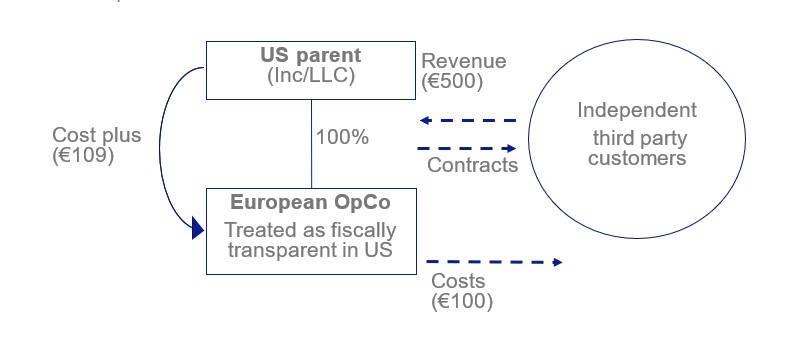
The Anti-Tax Avoidance Directive II: Will other jurisdictions follow the UK’s lead?
The Anti-Tax Avoidance Directive II: Will other jurisdictions follow the UK’s lead?
ATAD II is the EU translation of BEPS Action 2, the part which is focused on the ability of taxpayers to design situations of double non-taxation or heavily reduced taxation by exploiting hybrid mismatches. They apply to mismatches between the EU Member States, the UK, Mexico, Australia, New Zealand, and third countries. This legislation has been heavily criticised as it is very complex and compliance heavy.
The anti-hybrid rules generally apply to entities that are disregarded or fiscally transparent. They can apply in other situations too, such as when financial instruments are treated differently for tax for each party to the instrument, or when entities are dual residents for tax purposes. For example, in the UK the rules apply to a US LLC or Inc. which owns all the shares in a UK entity, which is checked as a disregarded entity for US tax purposes (i.e. a hybrid entity).
The anti-hybrid rules generally disallow or defer deductions of a hybrid entity, except to the extent the deductions offset the hybrid entity’s “dual inclusion income”, which is generally the hybrid entity’s items of gross income that are subject to tax both at the hybrid entity level and in the owner’s country as part of the owner’s local income tax computation. The legislation can be complex to draft and apply. In the UK this has resulted in several changes to adapt the rules to apply them fairly. The most recent of these may require attention before the end of this year to treat the rules as always having had an effect.
Different countries have adopted the rules in different ways and from different days, some being stricter than others. The table below shows the effective dates in Western Europe.
| Territory | Rules effective from (i.e. first date on which disallowances arise under the local legislation) | Notes |
| Austria | 1 January 2020 | |
| Belgium | Applies before 1 January 2020 | |
| France | 1 January 2020 | |
| Germany | 1 January 2020 | |
| Ireland | 1 January 2020 | |
| Liechtenstein | N/A | |
| Luxembourg | 1 January 2020 | In Luxembourg, imported mismatches legislation applies from 2021. |
| Monaco | N/A | |
| Netherlands | 1 January 2020 | |
| Spain | 1 January 2020 | In Spain, the measures apply from 1 January 2021 for entities applying calendar year and from 1 January 2020 for entities with the split year which had not ended as of 11 March 2020 |
| Switzerland | N/A | |
| UK | 1 January 2017 | Further legislation in the UK came into force on 10 June 2021 providing additional options for companies |
The UK rules have changed several times over the years to account for unintended effects of the legislation as originally drafted. For example, the legislation was amended in 2018 (backdated to 1 January 2017) for hybrid entity double deduction mismatches, to take account of income received only by the investor. However, the amendment was limited in its application. The rules have been amended yet again (with effect from June 2021) to widen the circumstances where unintended effects of the legislation do not result in a disallowance of a deduction. However, in order to treat the amendments as having full retrospective effect back to 1 January 2017, an election is required by 31 December 2021.
Here is an example to bring to life the differences in outcome.
Under the old UK rules and current rules in Western Europe, if OpCo (disregarded entity) incurs costs of €100 in providing services to Inc/LLC in return for a cost-plus reward of €109:

then such costs are effectively deductible both in the US as well as locally i.e. there is double deduction. However, because the cost-plus remuneration of the entity is not recognised in the US due to the entity being disregarded, the dual inclusion exemption does not immediately apply. In order for the 2018 exception to a disallowance to apply, the business had to show that the payment to the UK subsidiary arose as a direct consequence of the receipt from the third party, which was difficult to apply.
The revenue of €500 is taxed in the US and despite that there is no tax benefit arising from the hybridity of the entity as the double deduction of its third-party costs are offset by the non-deductibility of the inter-company payment for US tax purposes, the costs incurred by OpCo (€100) would not be deductible. This would lead to economic double taxation.
To avoid double taxation in the UK, the following significant update to the legislation has taken place.
New ‘deemed’ dual inclusion income concept
Many taxpayers will welcome the new ‘deemed’ dual inclusion income concept in the UK which deals with the unfair application of the rules. It does that by treating the inter-company payment as though it is dual-inclusion income as it is taxable in the UK and not deductible in the US (or anywhere else). That non-deductibility is a result of UK OpCo’s status as a hybrid entity (if UK OpCo was not “checked”, then the US would allow a tax deduction in respect of the inter-company payment).
The default statutory position is that this change will happen on a prospective basis. However, if a retrospection election is made the deemed dual inclusion concept would apply from the commencement of the rules.
Conclusion
UK businesses have until 31 December 2021 to make the retrospection election. The complexity of the UK rules means that further changes are still being introduced. Further legislative amendments are proposed that will treat US LLCs seen as transparent by all their remembers in the same manner as partnerships for the purpose of hybrid payee deduction/non-inclusion mismatches. All potentially affected groups should be analysing the impact on their business of the recent changes to the UK hybrid mismatch rules, as well as the impact of the application of ATAD II in other European jurisdictions.
If the other EU Member States, all of which are required to adopt such legislation, do not follow the UK’s lead in the future, then it may be more straightforward for US businesses to invest in Western Europe via the UK, unless a local presence is commercially appropriate.


Brazil’s 2026 tax reform: preparing for transition
Starting in January 2026, Brazil will enter the transition phase of its most ambitious tax reform in decades — a structural overhaul that will reshape the taxation of goods and services. While the reform aims to simplify one of the world’s most complex tax systems, its scale and impact cannot be underestimated: it will redefine […]

Pillar 2 GloBE rules technical series: how complex structures and reorganisations impact GloBE
The ninth session of series on Pillar 2 GloBE model rules focuses on the challenges posed by complex structures and reorganisations and how they impact Global Anti-Base Erosion (GloBE) income. The GloBE rules apply to multi-national enterprise (MNE) groups that have consolidated revenue of EUR750m or more in at least two of the four fiscal […]

Pillar 2 GloBE rules technical series: using elections to align and simplify GloBE computations
The seventh session of our 10-part series on Pillar 2 GloBE model rules focuses on how elections can help align GloBE income to mirror local tax treatment and iron out issues that could skew the effective tax rate (ETR). There are also elections that recognise the difficulty of obtaining the numerous data points needed to […]

Pillar 2 GloBE rules technical series: navigating adjusted covered taxes
The sixth article of our series on Pillar 2 GloBE model rules focuses on how to identify the key principles of adjusted covered taxes. Adjusted covered taxes is the numerator in the formula for determining the effective tax rate under the main Pillar 2 rules. As well as discussing points such as the definition of […]

Pillar 2 GloBE rules technical series: unpacking and applying GloBE model rule adjustments
Continuing our technical series on Pillar 2 GloBE, article five aims to assess how to determine your Financial Accounting Net Income or Loss (FANIL) by applying the relevant OECD-listed adjustments, alongside a brief overview of other additional adjustments. As discussed in previous articles in this series, calculating any top-up tax liability under Pillar 2 begins […]

Pillar 2 GloBE rules technical series: understanding how Pillar 2 GloBE impacts tax accounting
Continuing our technical series on Pillar 2 GloBE, this article aims to give an overview of the relationship between tax accounting and Pillar 2 GloBE. As well as highlighting basic accounting principles, the article will summarise issues relating to the computation of the effective tax rate, top-up tax, GloBE income or loss, covered taxes and […]

Next step in DAC9 legislation: council of the European Union reaches agreement on standardisation of GIR
In mid-February, the European Parliament (EP) voted by a majority to adopt the DAC9 legislative initiative. Now, the Council has reached a political agreement on the new EU directive. It acts as the sole legislator and will formally adopt DAC 9 after the revision is completed. The previous proposal by the European Commission primarily aims […]

Pillar 2 GloBE rules technical series: addressing MNE group complexities under Pillar 2 GloBE
Following on from article two in our technical series on Pillar 2 GloBE, this article aims to peel away further layers of how the GloBE rules define MNE groups. In particular, we will look at some of the more complex situations likely to arise in determining an MNE group. As discussed in our previous article, […]

Pillar 2 GloBE rules technical series: understanding MNE group structures through the lens of the GloBE rules
One of the fundamental exercises for in-scope multinational enterprise (MNE) groups subject to Pillar 2 GloBE rules is to gain an in-depth knowledge of constituent entities (CEs) and permanent establishments (PEs) on a country-by-country basis. It is an important task that will help ensure calculations required to determine your top-up tax liability in each jurisdiction […]

Risk management: adding value with a tax control framework
The tax risks facing global organisations increase every year. In the EU alone, data from the European Commission shows there are around 900 double taxation disputes, estimated to be worth €10.5 billion.These figures are likely to continue increasing over the coming years, as governments and tax authorities around the world align their approaches, increase global […]

Pillar 2 GloBE rules technical series: getting to know top-up taxes and safe harbours
With the Organisation for Economic Co-operation and Development’s (OECD) Pillar 2 Global anti-Base Erosion (GloBE) Rules now in play, understanding who, what, and how the regime will impact multinational enterprises (MNEs) is vital. With new OECD guidance being steadily released, keeping abreast of changes affecting how the rules are interpreted and what options an MNE […]

Maximising privately owned business efficiency with a tax control framework
Implementing a tax control framework (TCF) might sound like something only large multinational PLCs need to worry about. But for privately-owned businesses, a tax control framework also offers great opportunity. The risks a TCF guards against may be different in scope for a typical owner-managed business, but there remain significant penalties for the wrong approach. […]

Enhancing business sustainability through effective tax control frameworks
Sustainability challenges have become critical business imperatives in recent years. Regulators, stakeholders, investors, employees, customers – all expect a much higher degree of compliance and transparency. Businesses have got used to their performance in these areas being monitored and to being held accountable for any weaknesses. Although much of the focus on ESG (Environmental, Social […]

Tax transparency on allocation of group profits in the light of Public CbCR
Taxation has a key role for medium and large multinational companies in the process of developing a sustainable business model. Disclosure of complex tax information and transparency on profit allocation to group entities is key to this transformation process and will become a reality with new reporting standards and EU disclosure obligations. The Global Reporting […]

Proposed CAMT regulations: impact on foreign parented multinational groups
The CAMT imposes a 15% minimum tax on the adjusted financial statement income (AFSI) of large corporations and is effective for taxable years beginning on or after January 1, 2023. For these purposes, a large corporation is one with an average AFSI (as adjusted by the CAMT rules) of $1 billion over the three-year period […]

Occasional and temporary provision and notification of services in Luxembourg
Companies established in a country of the European Union may undertake occasional and temporary activities in Luxembourg. Though such activities do not constitute a permanent establishment in Luxembourg, there are still certain formalities that need to be complied with such as: The notification of services is valid for 12 months and can be renewed […]

Beta Healthcare International Limited vs. Commissioner of Tribunal – A Battle Of Transfer Pricing Methods
On 9 February 2024, the Tribunal issued a ruling in the case KETAT 143 (KLR) between the appellant Beta Healthcare International Limited (Beta Kenya) and the respondent the Commissioner of Legal Services and Board Coordination (KRA). The matter in dispute was the appropriate transfer pricing method to apply to intragroup sales, with the KRA arguing […]

Tax control frameworks: an international perspective
Tax control frameworks (TCFs) are increasingly seen as an essential tax management and compliance tool for businesses of all sizes. Around the world, tax authorities are taking a stricter approach to taxation matters. At the same time, organisations like the OECD and the EU are introducing new guidelines and regulations to strengthen corporate compliance, including […]

Implementing the right tax control framework
There are two main drivers for organisations looking for advice around tax control frameworks (TCFs). Sometimes it is a proactive strategy to check their tax affairs are in good shape or to better understand any potential liability risks, for example. Alternatively, they may already be aware of tax compliance issues they need to deal with […]

Peru – Chile double tax treaty: new interpretation guidelines from Peru’s Tax Administration radically affect the taxation of indirect disposals of shares
Background Under Peruvian Income Tax provisions, non-residents are levied on Peruvian-source income identified based on an all-exhaustive list. Capital gains arising from an indirect disposal of shares issued by a company incorporated in Peru qualify as Peruvian-source income. According to these rules, an indirect disposal occurs when shares of a non-resident company are sold, and […]

Using CbCR data as a Pillar 2 GloBE starting point
Designed to ensure that multinational enterprises (MNEs) pay a global minimum tax (GMT) of 15% in each jurisdiction where they operate and generate income, the Pillar 2 global anti-base erosion (GloBE) rules are now a reality for in-scope MNEs and very large groups with €750m consolidated global turnover. With some MNEs facing assessments as early […]

Is there a mandatory use of the median: Checkpoint Technologies Kenya Limited vs. Commissioner of Domestic Taxes
This is a case between the appellant Checkpoint Technologies Kenya Limited (CTK) and the respondent Commissioner of domestic taxes (Kenya Revenue Authority – KRA). The case illustrates that jurisdictions that implement transfer pricing rules applying the OECD guidelines will be held to account in line with those guidelines. In this case, KRA argued for a specific […]

How to develop a robust tax control framework for your business
Developing and implementing a tax control framework (TCF) is a strategy being adopted by an increasing number of companies around the world. There is no universal approach to developing a TCF. At Forvis Mazars, based on our wide experience working with a diverse range of companies to implement tax control frameworks, we take a structured, […]

Is a change of tax mindset now needed?
For Singapore and many other countries that have traditionally leant on financial incentives to attract foreign direct investments, the ambition of a 15% minimum global tax presented by Pillar 2 Global Anti-Base Erosion rules (GloBE) heralds a new challenge. While there is little doubt that having a fairer international tax system is a much-needed move, […]

New app from the Mexican Tax Administration Service designed to determine the monthly VAT returns automatically
The Mexican Tax Administration Service (SAT) continues to innovate and invest in technology and artificial intelligence to make it easier and more efficient for taxpayers to file their monthly tax returns. On February 1st, 2024, The Mexican Tax Administration launched a new online platform for filing the monthly Value Added Tax (VAT) returns, which will […]

A basic guide to understanding Pillar 2 GloBE minimum top-up tax rules
As in-scope organisations* embark on a new Pillar 2 Global Anti-Base Erosion (GloBE) journey, having a clearer understanding of how jurisdictions will enact the global minimum 15% tax rule is vital. Notably, while Pillar 2 GloBE sets out model rules on what jurisdictions need to achieve, there is an element of flexibility in how each […]

The benefits of having a tax control framework
Tax control frameworks are becoming increasingly common as companies seek to manage their taxation, compliance, and risk management obligations more effectively and efficiently. So, what is a tax control framework, and what are the benefits? A tax control framework is a set of processes and internal control procedures that ensure a company’s tax risks are […]

UK Spring Budget 2024
The UK Spring Budget on 6 March 2024 was relatively measured in its tax policy decisions, despite a background of falling inflation and rising tax receipts. Below are some areas of interest for globally mobile individuals, those with UK staff, and those with business and investment interests. Main measures affecting individuals Main measures affecting those […]

Italy – Extension of participation exemption (PEX) regime to non-resident (EU/EEA) companies/entities
The Italian Budget Law (Law issued on 30.12.2023, No. 213 – “Legge di Bilancio 2024”) established that Italian-source capital gains realised on disposal by EU or EEA resident entities without an Italian PE, where the disposal is of a substantial participation in an Italian company meeting certain conditions, will benefit from the participation exemption (PEX) […]

How much do you really know about your Pillar 2 disclosure obligations?
With jurisdictions still in the process of enacting local tax law to introduce Pillar 2 Global Anti-Base Erosion (GloBE) rules, groups in scope of the new regulations could be forgiven for taking a watch-and-wait approach. However, a general lack of awareness of how the rules impact entities is also hindering much-needed communication between the C-suite, […]

Dutch Supreme Court opens up new possibilities to deduct costs related to the sale of participations
Under the Dutch CIT rules, profits and capital gains related to participations are exempt for tax purposes. This also limits the deductibility of costs that directly relate to the acquisition or sale of such a participation. The exact determination of what costs are related to an acquisition is therefore regularly subject to discussion with the […]

The right tax approach: why companies need a tax control framework
Across the globe, an increasing number of companies are developing tax control frameworks to help them stay on top of their taxation, compliance and risk management obligations and objectives. These obligations are continually evolving, driven by a combination of both...

Ecological taxes: new updates in Mexico
Several Mexican states had imposed ecological taxes in order to encourage certain industries to reduce their polluting emissions. In addition, green taxes have recently been imposed as a consequence of the warning issued by the Mexico Climate Initiative (MCI) that Mexico’s carbon dioxide emissions could increase by up to 59.8% by 2050 if the country’s green […]

A basic guide to understanding Pillar 2 GloBE minimum top-up tax rules
As in-scope organisations* embark on a new Pillar 2 Global Anti-Base Erosion (GloBE) journey, having a clearer understanding of how jurisdictions will enact the global minimum 15% tax rule is vital. Notably, while Pillar 2 GloBE sets out model rules on what jurisdictions need to achieve, there is an element of flexibility in how each […]

IAS accounting requirements for Pillar 2: GloBE for periods ending 31 December 2023
Background to Pillar 2 (GloBE) Part of the ongoing work of the OECD to combat tax avoidance and targeted at low tax jurisdictions, the Pillar 2 – GloBE rules will apply to large organisations (>€750m of global revenue) with each country having its own rules implementing some form of 15% minimum tax, or otherwise risking […]

Navigating the tax implications of remote work in Canada
As the working environment adapts to offer more flexibility with remote working options, understanding the tax nuances of cross-border remote working is becoming increasingly crucial. More than ever, employers are offering their teams the opportunity to work abroad for limited periods each year. Whether you’re a non-resident considering remote work in Canada, or an employer […]

Romania prepares to enact Pillar 2 Global Anti-Base Erosion (GloBE) rules
Initiated by the Organisation for Economic Co-operation and Development (OECD) the Pillar 2 GloBE rules aim to stop tax competition between countries and to limit the shifting of profits to low-tax jurisdictions. As a result, large multinational groups (MNEs) with global annual revenue exceeding €750m will need to pay a minimum 15% tax on income […]

Green investments in Austria: new tax allowance introduced effective 2023
When the Austrian government – a coalition between the conservative People’s Party and the Green Party – presented their government program for 2020-2024, an “eco-social tax reform” was one of the key elements. The most recent measure has been the introduction of an investment allowance that especially incentivises “green investments”. The two main pillars of […]

ESG from Transfer Pricing Perspective
This article analyses the impact of ESG on MNE tax management with a special focus on transfer pricing and business restructuring. Tax Management and ESG As stated by the UN, environmental social and corporate governance (ESG) is not only an issue that concerns individuals but also a strategic priority of multinational enterprises (MNEs), investors and […]

South Africa ratifies MLI and develops synthesised DTAs
Adopting the Multilateral Convention to Implement Tax Treaty Related Measures to Prevent Base Erosion and Profit Shifting (MLI) has been an important development in the international tax landscape, having far-reaching effects on the double tax agreements entered into between countries. Even though not obliged to do so, South Africa opted to develop synthesised texts to […]

How CARF, MiCA, and DAC8 will impact tax transparency in relation to the WEB 3 and other recent web developments
The development of new web communication systems such as WEB3 is making it very difficult for tax authorities to trace taxable transactions. However, measures proposed by the OECD and the European Union aim to provide a framework that will permit traceability of tax transactions. The technical characteristics of a crypto asset make it difficult for […]

ATAD3 update: significant amendments recommended by the European Parliament
The European Parliament proposes significant amendments to the Anti-Tax Avoidance Directive, commonly known as ATAD3. ATAD3 seeks to prevent the misuse of shell companies for tax purposes. Compared to the initial draft Directive, the proposed amendments may provide relief for international organisations. In essence, ATAD3 imposes increased reporting obligations and denial of tax benefits under […]

Mexico approves the Multilateral Instrument (MLI) to implement Tax Treaty Measures
On 12 October 2022, the Mexican Government approved the Multilateral Instrument (MLI) related to the application rules for double taxation agreements (DTAs) to prevent Base Erosion and Profit Shifting (BEPS). The rules were published in the Official Gazette of the Federation on 22 November 2022. Included in the Mexican Government’s reservations and notifications are […]

French landmark decision on the “beneficial owner” concept for tax treaty purposes
A landmark decision on beneficial ownership could significantly impact the French tax authorities’ approach to tax audits concerning royalties. In its decision on French company Sté Planet dated 20 May 2022, the French Administrative Supreme Court (Conseil d’État) ruled for the first time that when French-sourced royalties are paid to a foreign person who is […]

EU’s new SAFE initiative to bolster existing tax evasion measures
The European Commission (EC) launched an initiative on 6 July 2022 concerning the fight against tax evasion and aggressive tax planning. As a result, a public consultation introducing the Securing the Activity Framework of Enablers (SAFE) directive has now been held. The proposed measures could increase compliance costs for all those involved in providing tax […]

Tax considerations for M&A in Mexico
During 2020, the mergers and acquisitions (M&A) market underwent some challenges due to the COVID-19 contingency and plenty of transactions were put off. Nonetheless, during 2021 and 2022, the M&A market recovered, as evidenced by the number of Mexican entities across various industries and sectors being acquired. Mexico’s main market comprises small and medium-sized enterprises (SMEs), […]

Proposed changes to the offshore regime for passive income in Hong Kong
Background To address harmful tax competition, the European Union (“EU”) requires Member States to refrain from introducing any new harmful tax measures and amend any laws or practices deemed to be harmful. Regarding non-EU jurisdictions, the EU has also evaluated their tax regimes against international tax standards and put in place a list of noncooperative […]

New CEE tax guide outlines fundamental changes and long-term trends
Providing information on taxation in 22 Central and Eastern European (CEE) states, the latest Mazars CEE tax guide analyses long-term taxation trends and fundamental tax regime changes in each country, both now and in previous years.

The Google tax: The UK story, 7 years later
The Diverted Profits Tax (DPT), or what the media have dubbed the Google tax, was introduced in 2015 to dissuade and counteract contrived arrangements used by large multinational groups that divert profits from the UK and erode the UK tax base.

The impact of digital assets and cryptocurrencies decentralised finance on taxation in various jurisdictions
Digital assets and cryptocurrencies continue to evolve by offering new services and products such as Decentralized Finance (DeFi) and non-fungible tokens (“NFTs”), but is tax legislation also keeping up to date with the ever-changing world of digital assets and cryptocurrencies?

Are you ready for the GloBE tax challenges?
On 14 March 2022, the OECD published a comprehensive commentary and illustrative examples of how implementing the Global Anti-Base Erosion Model Rules (GloBE rules) could look. In this blog, we discuss the GloBE rules and examine how the rules apply and filing requirements. On 20 December 2021, the OECD published model rules that member countries […]

Environmental tax pillar in the environmental, social, and governance system
The information regarding environmental taxes paid by an organisation, as well as the actions taken to mitigate the impact on the environment could be included in environmental, social, and governance (ESG) reporting. Environmental reporting in total is an important element for parties to consider when doing business. Along with environmental reporting, environmental taxes play a […]

French landmark decision on foreign tax credit imputation for capital gains on shareholdings: an extension to dividends?
In a decision “Air Liquide” dated 15 November 2021, the French Administrative Supreme Court (Conseil d’Etat) ruled for the first time that French resident companies realising capital gains upon the alienation of eligible participation (titres de participation – generally presumed for a 5% interest held for a minimum two-year period) in a foreign company are […]

The proposed new EU “Unshell” directive
On 22 December 2021, the European Commission published a number of Directives impacting a wide variety of corporate structures and taxpayers. One of these Directives is “laying down rules to prevent the misuse of shell entities for tax purposes and amending Directive 2011/16/EU’’, commonly referred to as ATAD3 or the Unshell Directive (see here) (hereinafter […]

Tax compliance and incentives during martial law in Ukraine
A crucial number of Ukrainian companies (including subsidiaries of international enterprises) experienced negative business and financial impacts as a result of the Russian invasion of Ukraine which started on 24 February 2022. The urgent relocation of staff to other regions of Ukraine and abroad, interruption of access to internal databases, IT systems, and paper documents […]

Corporate income tax changes in Poland for 2022
As of January 1, 2022, significant changes concerning the Polish tax system called the Polish New Deal came into force. These amendments also include Corporate Income Tax (CIT). Changes in withholding tax The major changes concern: Implementation of pay and refund mechanism (mechanism introduced in 2019 and suspended until the end of 2021) as the basic mechanism of […]

MNEs subject to 15% minimum tax rate from 2023: main OECD provisions and EU implementation proposals now available
The OECD two-pillar approach In October 2021, the OECD’s 137 Inclusive Framework members agreed to adopt a two-pillar approach to address the tax challenges of the digital economy. Pillar I provides for new profit allocation and nexus rules for MNEs with a turnover greater than EUR 20 billion and profit before tax margins of 10% […]

Criminalisation of tax litigation in France
Many jurisdictions have refined and improved their legislative defenses against tax avoidance in recent years, making the penalties for tax fraud even tougher.

Tax updates in the context of the digital economy
Key milestones are being reached in the digital economy in 2021. In this post, we review the most recent legislation and provide insight on how to keep up with the tax aspects of this fast-developing topic. Digital commerce is increasing globally as the world becomes ever-more interconnected. More and more companies are exclusively active in […]

Is the new two-pillar solution to address tax challenges suitable for African countries?
This new solution is expected to reallocate more than $100bn of profit annually to market jurisdictions. However, this raises the question, to what extent emerging economies, and more specifically, African countries, will be entitled to levy taxes on profits generated by multinational enterprises from their markets? This source and others are sorely needed by these […]

Tax vendor due diligence is an attractive tool in the M&A transaction process
Background – the current market The disruptive effect of the Covid-19 pandemic and the economic recovery currently underway in many jurisdictions has driven strong momentum in the M&A market in recent months. Among the factors that drive this demand may be the need to enhance growth, diversify, raise finance or refocus on core activities. Commercial and […]

Tax issues arising from corporate amalgamations in Hong Kong
In June 2021 Hong Kong finalised legislation codifying the Inland Revenue Department’s tax assessment practice relating to corporate amalgamations. For qualifying companies, it is possible to elect (within one month of the amalgamation) for special tax treatment for pre-amalgamation losses, succession to business assets, amongst other areas. While the new legislation provides greater certainty on […]

Compliance bulletin helps businesses in Mexico
Mazars experts around the world deliver tailored services in audit, accounting, tax, financial advisory, consulting, and legal services. In Mexico, local experts have created a compliance dashboard with news items to help guide businesses as they navigate issues related to finance, tax, legal, and labour updates. With the global economy recovering from Covid-19, new government-required procedures […]

The globalisation of the German Reorganisation Tax Act through the Corporate Modernisation Act
Many countries have their own versions of tax-free or tax-neutral reorganisations. We are seeing instances where such domestic legislation now is subject to amendment with some added or bonus enhancements to these laws. What follows below are some recent changes to the German restructuring tax code provisions. We aim to continue to highlight more countries […]

Switzerland is an attractive business hub. What is their secret?
Choosing a business location involves many considerations, with tax being only one of them. Nevertheless, tax is a consideration. Below is a note commenting on the attractions of Switzerland as a business location. There may of course be other locations that should be considered. Switzerland attracts global business, research, and innovation, and maintains the high ground […]

Tax aspects of opening a business hub in Asia
The Asian Development Bank has forecast that developing Asia’s growth is forecast to rebound to 7.3% in 2021 and 5.3% in 2022. This compares to 4.2% and 4.4% respectively for Europe (see here) and 6.9% and 3.6% for the US (see here). Businesses already with a footprint in the Asian region will be gearing up their operations to deal with the region’s expected […]

Migrants and refugees have employment rights and obligations in Uruguay
As Covid restrictions begin to lift there will inevitably be increased movement of workers across borders. This brings back into focus a range of global mobility and tax considerations for businesses and individuals. Examples include work permits, visas, payroll and social security amongst other issues. Below is a snapshot of some pints concerning Uruguay to […]

Special Purpose Acquisition Company (SPAC) – Is this tax vehicle a blank check?
Is it a bird? Is it a plane? Why is a SPAC considered a ‘high flying’ concept and what tax issues need to be considered to reap the benefits and avoid the pitfalls of a SPAC transaction? In this article, we provide a brief overview of SPACs, the particular tax issues relevant to the US […]

The new great debate: minimum global corporate income tax?
The new U.S. Secretary of Treasury, Janet Yellen, has garnered this week’s tax spotlight with her support and request for the world to support a minimum global corporate income tax. This would apply to the largest and most profitable businesses (numbering around 100), with the suggestion that the minimum rate to be applied to be […]

How to attract private capital to fund the new American Jobs Plan?
On March 31, 2021, the Biden administration released The American Jobs Plan, which detailed, among other critical items, the need for infrastructure improvements to enhance America’s competitiveness and to create well-paid American jobs. For this to be successful in attracting needed private capital, the existing regulations concerning Real Estate Investment Trusts (REIT) and Foreign Investment in […]

Tax reclaim opportunities regarding withholding taxes in Germany
As a result of a number of recent cases there are tax reclaim opportunities for non-German investors in German companies that have suffered withholding taxes (WHT), subject to meeting certain conditions. Points to consider A complete or partial WHT relief may now be possible: i) where there is no Double Taxation Treaty (DTT) in place […]

Governmental proposal for redraft of German “Anti-Treaty Shopping Provision”
Background On January 20, 2021, the German government published a draft law for the Gesetz zur Modernisierung der Entlastung von Abzugsteuern undder Bescheinigung der Kapitalertragsteuer (Act for modernization of the relief of withholding taxes and the certification of capital gains tax, AbzStEntModG). Among other things, this draft contains a new wording proposal of the so-called “Anti-Treaty Shopping” provision in Sec. 50d (3) German Income Tax Act (ITA), in order to comply with European law requirements. Sec. 50d (3) […]

Brexit impact on in/outbound payments
When the UK finally left the EU ended on 31 December 2020, the application of provisions that have been beneficial to cross-border payments within the EU ceased, or will cease to apply. The elimination of withholding taxes, formerly part of these provisions, means companies with cross-border dividend, interest and royalty payment flows to or from […]

New German tax developments regarding intellectual property (IP)
Decree of the Federal Ministry of Finance dated 11 February 2021 – Remuneration of the temporary transfer and the disposal of rights which are entered in a German public register. Further information on German tax developments relating to intellectual property (IP) registered in Germany has been released by the German Authorities. This helps to clarify how the German taxing right can apply to non-German users or vendors of this IP. This […]

Avoiding tax traps when relocating
Relocation is a factor that can drive M&A transactions and many jurisdictions use various strategies to attract or retain businesses, whether that be on tax, regulation, creation of critical business mass, or other reasons. There may be many non-tax reasons for enterprises to relocate, but there will always be tax consequences to consider. In this article, we outline the possible tax traps and opportunities for this type of activity. Main tax traps The main tax issues in business relocations, which can amount to traps if not fully taken into account in […]

DAC 6 developments, deadlines, and the question of legal privilege
While the first reporting deadlines for most EU members expired on 31 January 2021 and respectively 28 February 2021, there are still questions outstanding about whether intermediaries are obliged to report arrangements to tax authorities, or if they can use the right to waiver due to professional privilege. In 2020, countries across Europe implemented into […]

Changes to interest deduction limitation rules
The EU Anti-Tax Avoidance Directive (ATAD), contains five legally binding anti-abuse measures, which all EU member states are required to apply against common forms of aggressive tax planning. The Directive includes an exit tax, a general anti-abuse rule, controlled foreign company rules, measures to tackle hybrid mismatch arrangements, in addition to an interest limitation rule. We […]

Corporate income tax reform: tax loss relief limited to 50% of annual profits
The Dutch government has provided further details concerning a potential reform of the tax loss relief rules in the corporate income tax regime. The proposed amendment will mean that losses can be set off indefinitely from 1 January 2022, but the number of losses that can be set off will be capped. The government had […]

The impact of Covid-19 tax regulations on M&A transactions
In this article, we will focus on the impact of Covid-19 tax regulations in relation to M&A transactions. In particular, we will address the impact of several incentives that need to be addressed when transferring a company. Covid-19 Regulations Many countries have introduced Covid-19 related tax and other government incentives. These can – roughly – be broken into three categories: (i) extension of payment for taxes, (ii) a subsidy for wages (and sometimes […]

The UK fiscal environment for international business following Brexit
Following the UK’s spending review statement of 25 November, there is now greater clarity on how the UK economy will be taken forward into 2021 following the Covid-19 pandemic and exit from Brexit transition. Despite incurring record UK government borrowing this year of around £395bn, the significant further borrowing to fund investment during the recovery […]

French landmark decision fighting against “commissionaire” arrangements in the digital economy
After the French government enacted a 3% digital services tax on gross income, it is now the French Administrative Supreme Court which rendered a landmark decision for international groups providing digital services in France by strongly extending the definition of permanent establishment in the presence of commissionaires. This new case law remains also relevant for […]

DAC6 tightens the reigns on M&A deals across the globe
EU Directive 2018/822 or DAC 6 (acronym of “Directive on Administrative cooperation”) is in the minds of many European tax practitioners. In this article we will set out its importance for the European M&A market. Beyond this mysterious acronym, the European Union is pursuing its efforts to prevent tax fraud and tax evasion (and thus create legal and business ” fairness […]

ICAP 2.0 – A solution to aggressive tax audits for MNEs during Covid-19
Governments damaged by the Covid-19 pandemic are likely to be taking a more aggressive approach in tax field audits on multinational enterprises (MNEs), at least until after their respective economy is on its way to recovering from the impacts of the pandemic. The OECD launched a pilot of the International Compliance Assurance Programme (ICAP) on […]

The future of joint tax audits beyond Covid-19
The current restrictions imposed by multiple countries to combat the Covid-19 pandemic have limited the possibilities for conducting external tax audits. However, the current pandemic and its consequences for the world economy highlight again that the number of internationally active companies is increasing. This has a significant impact on the future of tax audits. Coordinated […]
